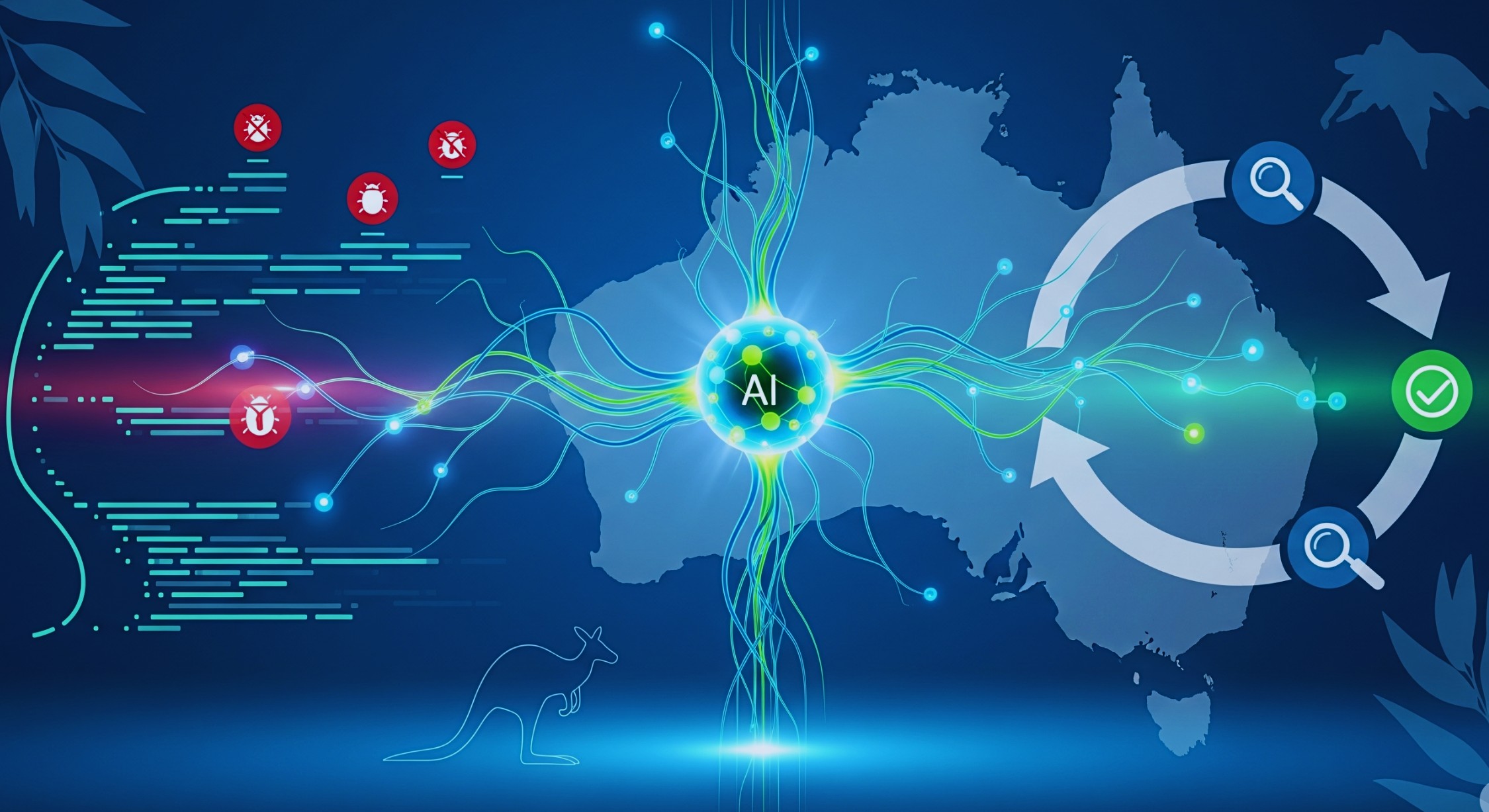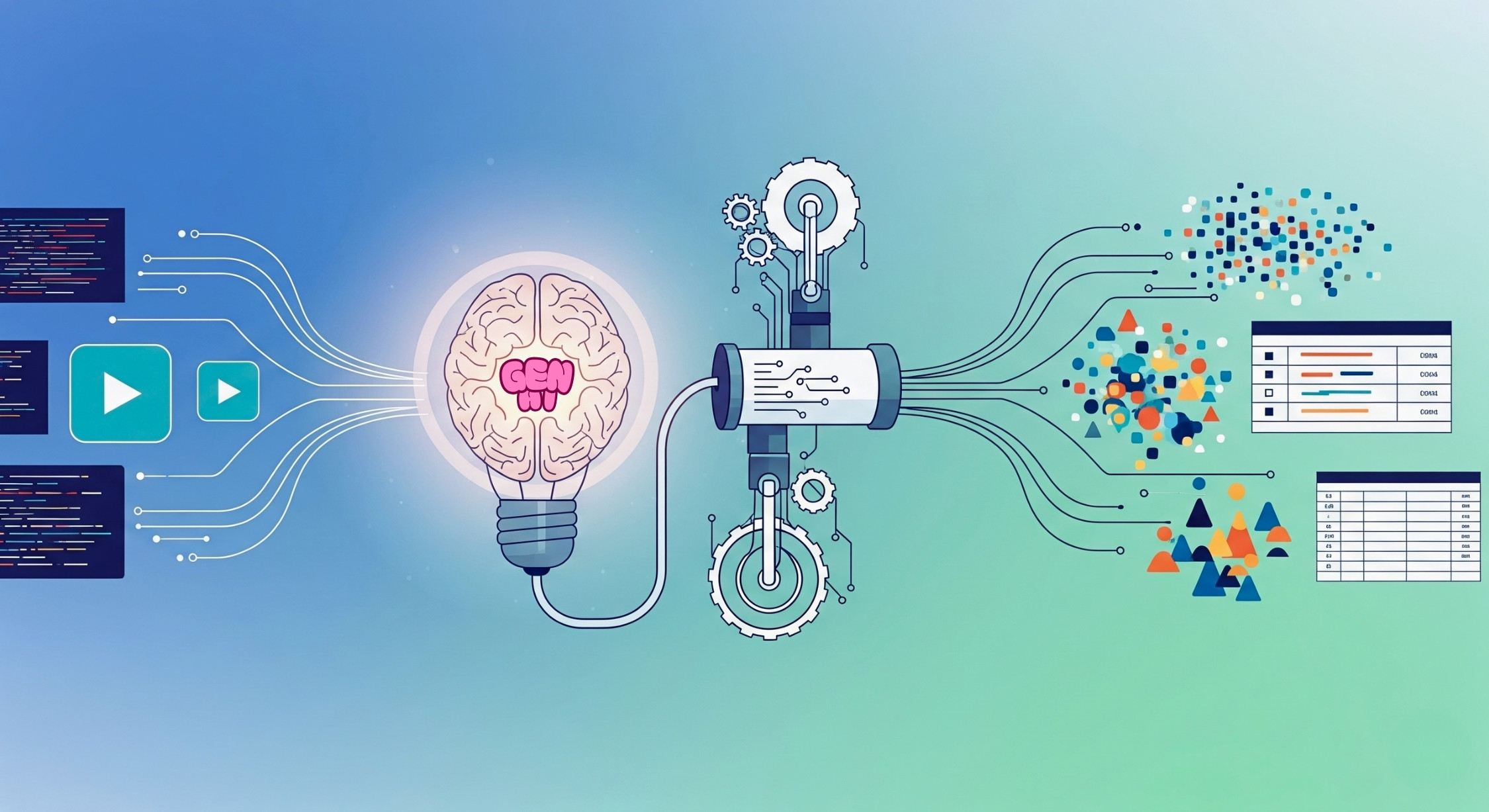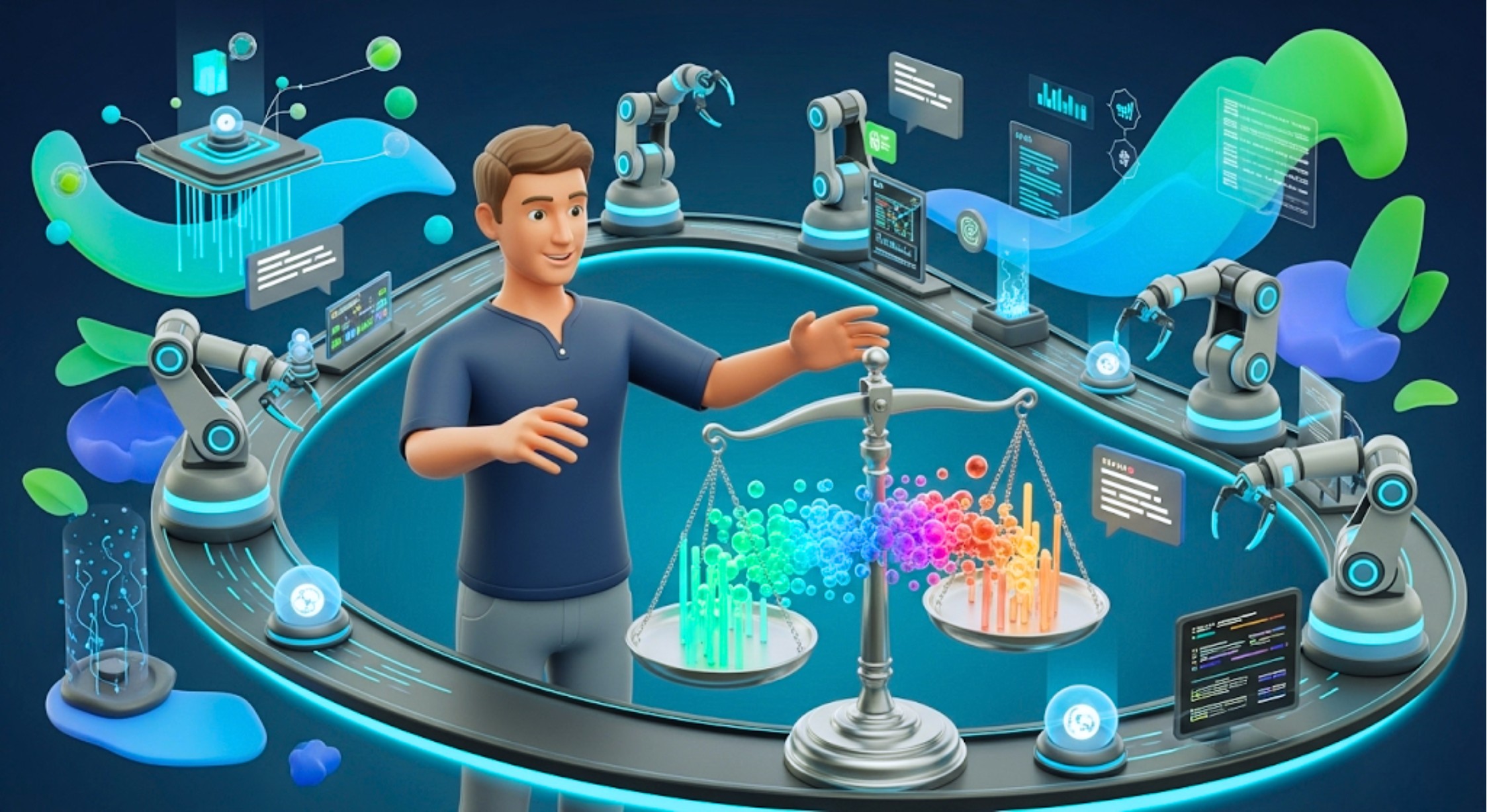At Experion, we combine deep domain expertise, advanced AI capabilities, and a strong innovation mindset to help businesses in Australia and beyond unlock the true potential of AI in software testing.
The Evolution of Software Testing in Australia
Over the past two decades, the software testing ecosystem in Australia has experienced a profound and dynamic transformation. What once relied almost entirely on manual testing, carefully executed by QA teams following step-by-step test scripts, has shifted toward a technology-driven approach powered by automation, continuous integration, and intelligent testing tools.
In the early 2000s, Australian organisations primarily depended on manual validation processes, which were effective but often time-consuming and resource-heavy. The emergence of test automation frameworks brought a turning point, enabling QA teams to execute repetitive test cases faster and more consistently. This adoption coincided with the rise of continuous integration pipelines, which allowed developers and testers to collaborate more closely, integrating quality checks into the development lifecycle rather than leaving them as a final step before release.
Today, the pace of the digital economy in Australia has intensified these demands even further. Businesses now expect:
- Shorter release cycles to match agile development sprints.
- Higher product quality with zero tolerance for critical defects in production.
- Rapid adaptability to shifting market conditions and evolving customer expectations.
The evolution has also been driven by the increasing complexity and diversity of applications in the Australian market, spanning responsive web solutions, high-performance mobile apps, IoT-enabled devices, and mission-critical enterprise platforms. Each category demands unique testing strategies, robust automation frameworks, and the ability to validate performance under real-world conditions.
While traditional testing approaches served their purpose well in the past, they struggle to keep up with the velocity of modern development methodologies like agile and DevOps. These practices require near-continuous validation, tight collaboration between teams, and intelligent tools capable of learning and adapting. As a result, QA in Australia is no longer just about defect detection, it has evolved into a continuous, integrated quality engineering process that drives innovation and business growth.
The Rising Influence of AI in QA Processes
The adoption of AI in software testing has fundamentally redefined how testing teams plan, execute, and validate their work. By leveraging advanced algorithms, AI can process large volumes of historical and real-time data to detect hidden patterns, anticipate defects before they occur, and recommend precise corrective actions. This analytical capability means QA teams in Australia are no longer spending the majority of their time on repetitive manual checks. Instead, they can focus on strategic oversight, refining testing strategies, and driving higher software quality standards.
Key capabilities such as AI-powered test case generation, intelligent test prioritization, and automated defect detection are now enabling businesses to deliver faster, more reliable releases. These advancements reduce the time-to-market and lower operational costs, making AI-driven QA an essential competitive advantage in sectors where innovation speed matters most.
The arrival of Generative AI in testing is extending these capabilities even further. This technology does not just optimize existing processes; it can produce entirely new testing artifacts, unlocking creative, adaptable, and highly responsive quality assurance workflows.
Generative AI for QA testing is built on advanced models such as Large Language Models (LLMs), which go beyond traditional AI’s ability to classify, predict, or optimize. These systems can create original outputs including test cases, scripts, test data sets, and technical documentation by learning from vast, diverse datasets.
What makes Generative AI transformative is its ability to adapt in real time. For example, it can read a newly written set of business requirements and immediately produce aligned, executable test scripts. It can also simulate complex, high-variability test data to challenge the application’s robustness. In Australian QA environments where speed, compliance, and coverage are critical, Generative AI introduces a dynamic layer of creativity and adaptability that conventional tools cannot match.
Understanding AI in Software Testing Within the Australian Business Landscape

AI in software testing refers to the use of intelligent, data-driven algorithms to enhance and automate different stages of the testing lifecycle. This includes planning, execution, reporting, and maintenance activities that traditionally required extensive manual effort. For Australian businesses operating in competitive industries such as fintech, healthcare, logistics, and retail, AI and software testing together offer the speed, precision, and scalability needed to meet market expectations without compromising on quality.
By automating routine and repetitive tasks, AI enables QA teams to improve test coverage, enhance defect detection rates, and reduce the time needed to validate software changes. More importantly, it creates a continuous feedback loop that helps teams learn from every test cycle and improve future releases.
Technologies Involved
- Machine Learning (ML)
ML models learn from historical test execution data and defect patterns to predict risk areas, recommend targeted test coverage, and improve maintenance efficiency over time. They can also identify redundant or low-value test cases to streamline test suites. - Natural Language Processing (NLP)
NLP enables AI systems to understand and interpret human-readable content such as requirement documents, user stories, or bug reports. This allows for the automatic generation of relevant and accurate test scenarios without manual scripting. - Computer Vision (CV)
CV technologies are used for visual testing by comparing UI screenshots, identifying inconsistencies, detecting design regressions, and validating multi-device compatibility. This is especially important in mobile-first markets like Australia, where user interface quality directly impacts customer satisfaction.
How AI Supports Different Testing Phases?
Artificial Intelligence is transforming each phase of the software testing lifecycle, making the process more strategic, precise, and efficient. By embedding AI into planning, execution, and reporting, QA teams can improve decision-making, reduce manual effort, and maintain higher software quality standards.
Planning
In the planning stage, AI leverages historical defect data, code change logs, and system architecture details to identify high-risk areas within the application. Instead of relying solely on human judgment, AI algorithms can analyze thousands of data points to spot patterns and predict where defects are most likely to occur. This insight allows QA teams to prioritize critical modules, ensure maximum test coverage, and design more effective test strategies. In the Australian market, where regulatory compliance and quality expectations are high, such precision in planning can prevent costly post-release issues.
Execution
During execution, AI-driven intelligent test selection streamlines the testing process by identifying and running only the most relevant test cases. This reduces redundancy, shortens testing cycles, and frees up resources for exploratory or complex testing tasks. AI can also dynamically adjust the execution order based on real-time results, ensuring that high-priority defects are detected early. For businesses operating in agile and DevOps environments, this adaptability supports faster release cycles without sacrificing quality.
Reporting
In the reporting phase, AI-powered analytics aggregate results from multiple test runs and generate comprehensive reports. These reports go beyond listing pass/fail outcomes, they summarize defect trends, highlight recurring issues, and pinpoint coverage gaps. AI can also provide actionable recommendations, such as suggesting additional test scenarios or flagging unstable components that require deeper analysis. This enables stakeholders to make informed decisions quickly and fosters a culture of continuous improvement in QA teams.
What is Generative AI in Software Testing?

Generative AI (Gen AI) represents a new class of artificial intelligence models that can create entirely new and original outputs, rather than simply analyzing or classifying existing information. In the context of software testing, this means generating critical QA assets, such as executable test cases, synthetic test data, user scenarios, and even detailed technical documentation, based on patterns learned from vast and diverse datasets.
Whereas traditional AI in software testing is focused on predictive analytics (for example, identifying high-risk areas of code) or optimization (such as prioritizing test execution), Generative AI in testing actively produces the artifacts that teams need to conduct comprehensive and efficient testing. This creative capability makes it particularly valuable for modern QA teams, especially those working within agile or DevOps environments where rapid iteration is essential.
For Australian businesses, generative AI for QA testing addresses a key industry challenge: the balance between speed and quality. By automating the creation of test materials, it significantly reduces the manual workload on testers. At the same time, it enhances both the breadth and depth of coverage, ensuring that even edge cases and complex workflows are accounted for. This enables QA teams to maintain high quality standards without slowing down release cycles.
Large Language Models (LLMs) such as GPT can process human-readable documents, like requirement specifications, user stories, or change logs, and translate them into immediately usable testing assets. This may include:
- Executable Test Scripts that are aligned with the most current business requirements.
- Synthetic Test Data that mimics real-world inputs while maintaining data privacy compliance.
- Defect Reproduction Steps that allow developers to quickly understand and resolve issues.
In essence, Gen AI in software testing combines automation with creativity, allowing QA teams to be more proactive, efficient, and effective in ensuring product reliability and customer satisfaction.
Difference Between AI and Generative AI in Software Testing
Traditional AI and software testing workflows rely on pattern recognition to enhance efficiency, such as identifying which test cases to run or predicting defect-prone modules. Generative AI in testing, on the other hand, actively creates the required testing artifacts.
|
Aspect |
Traditional AI in Testing |
Generative AI in Testing |
| Primary Function | Analyze, predict, classify |
Create, simulate, generate |
|
Output |
Test prioritization, defect prediction |
Test scripts, synthetic data, documentation |
|
Adaptability |
Requires predefined rules |
Learns dynamically and adapts to new contexts |
|
Example |
Selecting regression tests based on changes |
Writing new regression tests from updated specs |
Building a Generative AI Software Testing Strategy in Australia
 Adopting Generative AI in software testing requires more than simply adding new tools to an existing QA process. It is a strategic shift that involves aligning technology, people, and processes to work seamlessly together. For Australian businesses, where competition is strong and time-to-market pressures are high, this approach ensures that the benefits of Gen AI are fully realized without compromising accuracy or compliance.
Adopting Generative AI in software testing requires more than simply adding new tools to an existing QA process. It is a strategic shift that involves aligning technology, people, and processes to work seamlessly together. For Australian businesses, where competition is strong and time-to-market pressures are high, this approach ensures that the benefits of Gen AI are fully realized without compromising accuracy or compliance.
- Assess Current QA Maturity
Begin by evaluating the existing quality assurance framework. Identify how much of the process is already automated, where gaps exist in coverage, and which areas suffer from high defect leakage. This assessment forms the foundation for deciding where Gen AI can have the most impact. - Define Clear Objectives
Without specific goals, AI adoption can become unfocused. Businesses should set measurable targets such as reducing the time required to create test cases, increasing test coverage by a certain percentage, or improving defect detection rates before production. - Select the Right Tools and Models
Not all AI models are equally suited for software testing. Domain-specific Large Language Models (LLMs) trained for QA tasks can deliver better results than general-purpose AI. Selecting the right platform and tools ensures compatibility with existing systems and maximizes return on investment. - Ensure Data Readiness
Generative AI systems are built and validated using reliable, high-quality data. This requires curating clean, relevant, and up-to-date datasets while ensuring compliance with Australian data protection regulations. Sensitive customer or business information must be anonymized before use. - Plan for Integration
Gen AI solutions should integrate smoothly with continuous integration and continuous delivery (CI/CD) pipelines, test management systems, and defect tracking tools. Proper integration ensures that AI-generated assets are used effectively within the broader software delivery lifecycle. - Implement Human Oversight
While Gen AI can generate accurate and sophisticated test artifacts, human validation remains essential. Experienced QA professionals should review AI-generated scripts, data, and defect reports to confirm accuracy and ensure they align with business requirements.
Gen AI in Software Testing: Key Use Cases
Test Case Generation
Generative AI can interpret requirement documents, user stories, and acceptance criteria to create executable test cases that align directly with the latest business objectives. This reduces manual scripting effort and ensures consistency between requirements and tests.
Test Data Generation
AI can produce diverse and realistic datasets that mimic real-world conditions, including edge cases that might not be obvious to human testers. This improves application robustness while maintaining data privacy by avoiding the use of sensitive production data.
Bug Description & Reproduction
From error logs and user feedback, Gen AI can produce detailed defect descriptions along with clear reproduction steps. This speeds up the resolution process by enabling developers to quickly replicate and address issues.
Test Maintenance
When application interfaces or workflows change, AI can automatically identify impacted tests and update scripts accordingly, preventing failures caused by outdated test cases.
Code Review & Static Analysis Support
Generative AI can assist development teams by suggesting targeted test scenarios for newly added code segments, enhancing both coverage and early defect detection.
How Gen AI Completely Automates Software Testing?
 With the right infrastructure in place, generative AI for QA testing can manage nearly every stage of the testing lifecycle without constant manual intervention. It begins by reading requirements or change logs and generating the necessary test cases and datasets. These tests can be executed automatically, with results logged and analyzed in real time.
With the right infrastructure in place, generative AI for QA testing can manage nearly every stage of the testing lifecycle without constant manual intervention. It begins by reading requirements or change logs and generating the necessary test cases and datasets. These tests can be executed automatically, with results logged and analyzed in real time.
AI then identifies and documents any defects, providing clear reproduction steps and potential causes. It can even suggest code changes or configuration adjustments to address detected issues. Over time, the AI learns from historical outcomes, improving its test generation accuracy and defect prediction capabilities.
For Australian organisations operating within agile and DevOps environments, this capability enables near-continuous validation. New features can be tested almost as soon as they are developed, reducing release cycle times while maintaining high quality. The result is a QA process that is proactive, self-improving, and able to keep pace with rapid software innovation.
Benefits of Using Generative AI in Software Testing
The benefits extend well beyond simple automation:
- Accelerated Test Creation
Generative AI can produce complex test scripts and realistic datasets within minutes. This drastically shortens preparation time, enabling QA teams to focus on analysis and improvement rather than time-consuming manual scripting. - Expanded Coverage
By generating scenarios that might not be easily identified by human testers, Gen AI increases test coverage. This includes rare edge cases and unusual combinations of user inputs that could expose hidden defects. - Improved Accuracy
AI-driven generation of test cases and data reduces human error, ensuring consistency in execution and validation. This precision is critical for industries like healthcare, finance, and logistics, where even small errors can have significant consequences. - Cost Efficiency
By automating repetitive and labor-intensive QA tasks, teams can optimize productivity and allocate resources to higher-value activities, resulting in measurable cost savings. - Continuous Testing Capability
Gen AI enables QA to be embedded at every stage of the development pipeline, allowing for continuous validation in agile and DevOps environments. This leads to faster feedback loops and higher-quality releases.
At Experion, we work closely with Australian enterprises to harness generative AI in software testing as a catalyst for transforming QA processes from reactive to predictive and, ultimately, proactive.
Challenges and Considerations of Gen AI in QA
While generative AI for QA testing offers transformative advantages, its adoption must be carefully managed to avoid potential pitfalls:
- Accuracy and Validation
AI-generated outputs can be highly effective but still require expert review to ensure they are relevant, valid, and aligned with business requirements. - Data Privacy and Security
Sensitive business and customer data must be handled in compliance with Australian data protection laws. AI models should be trained on anonymized datasets to mitigate privacy risks. - Model Hallucinations
Generative AI can occasionally produce inaccurate or irrelevant results, such as invalid test steps or false defect reports. This risk must be mitigated with validation checks and human oversight. - Human Oversight
While automation is powerful, human QA engineers are essential for interpreting results, managing exceptions, and making context-driven decisions. - Integration Complexity
Successful deployment requires aligning Gen AI capabilities with existing QA tools, pipelines, and processes to avoid disruption and maximize adoption.
Future of Software Testing with Generative AI

The adoption of Generative AI in software testing is set to transform the QA function in Australia and across the globe. Its influence will go beyond automation, redefining the very roles, processes, and priorities within QA teams.
- Evolving QA Roles
The role of the software tester will shift from manual test execution to AI orchestration. Testers will become quality strategists, guiding AI-driven processes, validating outputs, and focusing on ensuring that AI-generated assets align with business goals and compliance standards. - Autonomous Testing Pipelines
By combining Gen AI capabilities with continuous integration and continuous delivery (CI/CD), organisations can create fully automated testing workflows. This will significantly reduce manual intervention, speed up release cycles, and improve product quality through real-time validation. - Ethical Testing Practices
Generative AI will play an important role in creating inclusive and representative test datasets. It can be used to identify and mitigate bias, ensuring that applications are fair and accessible to all user segments. - AI-DevOps Convergence
As AI becomes fully embedded within DevOps pipelines, testing will evolve into a continuous, intrinsic part of the software delivery process. Quality assurance will no longer be a stage—it will be a constant, real-time function that evolves with every build.
How Experion Can Help in Software Testing With Generative AI?
 At Experion, we create Generative AI in software testing strategies that align perfectly with the needs of Australian enterprises. Our approach is consultative, customised, and built for scalability. We work across industries such as healthcare, fintech, retail, and logistics to deliver measurable outcomes in QA transformation.
At Experion, we create Generative AI in software testing strategies that align perfectly with the needs of Australian enterprises. Our approach is consultative, customised, and built for scalability. We work across industries such as healthcare, fintech, retail, and logistics to deliver measurable outcomes in QA transformation.
Our expertise includes:
- End-to-End Gen AI Strategy Design and Execution – From assessment to deployment, ensuring a seamless integration into existing QA frameworks.
- LLM Integration with QA Pipelines – Leveraging large language models to generate, validate, and optimise testing artifacts in real time.
- Development of Domain-Specific AI Models – Training AI to meet the unique demands of your industry and product environment.
- Post-Deployment Support and Optimisation – Ensuring continuous improvement, accuracy, and alignment with evolving business needs.
Conclusion
Generative AI in software testing is not simply a technological upgrade; it is a strategic shift that positions QA teams for long-term success. By embracing this technology, organisations can streamline their testing processes, accelerate release cycles, and enhance software quality while maintaining compliance and user trust.
Key Takeaways
Experion delivers secure, scalable, and industry-specific Generative AI testing solutions, empowering Australian businesses to lead in the era of AI-driven quality assurance.
- Generative AI can automate the creation of test cases, synthetic data, and technical documentation.
- It offers broader and deeper test coverage compared to traditional AI-driven testing methods.
- AI-generated outputs require expert human oversight to ensure accuracy and business alignment.
- Strategic integration into QA pipelines maximises the return on AI investment.
- Experion provides platform-agnostic solutions designed for domain-specific needs.
- Generative AI supports continuous testing within agile and DevOps environments.
- Ethical AI practices ensure bias detection and the creation of inclusive datasets.
- AI-empowered QA roles will focus on orchestration, strategy, and compliance.
- Autonomous testing pipelines will drive faster releases and higher software quality.
- Ongoing optimisation and monitoring are essential for maintaining AI effectiveness.
Experion offers comprehensive, future-ready AI testing solutions tailored to your business needs. Contact our team today to explore how we can help you harness the power of Generative AI to deliver exceptional software quality at speed.

